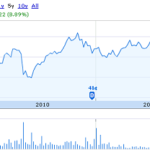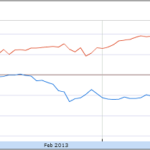Spread betting. What is it? And why should you consider it as an avenue for investment?
Spread betting is all about betting on whether the value of an asset will increase or decrease. So the first benefit is you don’t actually have to buy the asset in question. You’re simply gambling on its fluctuating value on indexes like the FTSE 100. Besides currencies and shares, spread betters can gamble on a wide range of other markets that even stretches to things like how many seats a political party will win in a general election.
How it works
The concept is relatively simple. Let’s take the FTSE index as an example. By monitoring the FTSE 100 on sites, you can bet that the market will gain or lose points. So providing you’ve bet in the right direction, you can win whether the index rises or falls.
The way the spread betting company makes money is by selling at a lower price and buying at a higher price. The difference is called the ‘spread’. If the FTSE 100 is sitting at 4500, the spread betting company might offer you a selling price of 4498 and a buying price of 4503.
Say you buy at £10 per point, betting that the market will rise, when the market closes out at 4520 you make £170 (£10 x the 17 point increase). If, however, the market closes out at 4494, you lose £40 (£10 x the 4 point decrease).
The pros and cons
Clearly spread betting is not without its risks, and while the more points the market falls or rises in your predicted direction, the more you will win, it works the same way if you get it wrong by a high number of points.
But there are other great benefits to spread betting, such as no capital gains tax, stamp duty, or income tax (unless it’s your sole avenue for income). Neither are you liable for brokers fees such as you would incur if you traded in stocks and shares. Spread betting agents take their cut from the spread and will usually take a deposit upfront, called the ‘margin’.
Safety tips
First-timers should bet with a well-known reputable spread betting company. Another essential safety net is the ‘stop loss’, which allows you to place a limit on the amount of money you are prepared to lose. If the asset drops below that marker, your bet is closed.
Spread betting is actually one of the easiest and cheapest ways for private investors to bet on markets that might otherwise be hard to access, using their gut instinct to potentially win big. Of course, there’s a chance you’ll lose big too, but the trick is to hang on to your winnings when you can, and exercise the same amount of caution you would with any gamble.
Image by Paul Wilkinson, used under Creative Comms license












{ 0 comments… add one now }